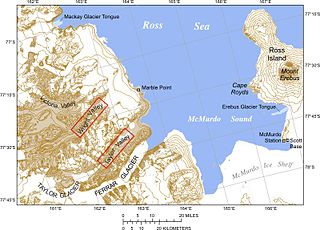
The McMurdo Dry Valleys are a row of largely snow-free valleys in Antarctica, located within Victoria Land west of McMurdo Sound. The Dry Valleys experience extremely low humidity and surrounding mountains prevent the flow of ice from nearby glaciers. The rocks here are granites and gneisses, and glacial tills dot this bedrock landscape, with loose gravel covering the ground. It is one of the driest places on Earth and has not seen rain for nearly two million years.

Lake Bonney is a saline lake with permanent ice cover at the western end of Taylor Valley in the McMurdo Dry Valleys of Victoria Land, Antarctica.

Alatna Valley is an ice-free valley lying 4 miles (6 km) north of Mount Gran and trending east-northeast for about 10 miles (16 km) along the southeast side of the Convoy Range. It is one of the northernmost of the McMurdo Dry Valleys. Parker Calkin, U.S. geologist, made stratigraphic studies in the valley during the 1960–1961 season. Named by Advisory Committee on Antarctic Names in 1963 for the gasoline tanker USNS Alatna (T-AOG-81) which participated in Operation Deep Freeze 1958–1959 and 1959–1960, and in keeping with other ship names in the Convoy Range.

Taylor Valley is the southernmost of the three large McMurdo Dry Valleys in the Transantarctic Mountains, Victoria Land, Antarctica, located west of McMurdo Sound at approximately 77°37′S163°00′E. The valley extends from Taylor Glacier in the west to McMurdo Sound at Explorers Cove at the northwest head of New Harbour in the east and is about 29 kilometres (18 mi) long. It was once occupied by the receding Taylor Glacier, from which it derives its name. Taylor Valley contains Lake Bonney in the west (inward), and Lake Fryxell in the east (coastward), and Lake Hoare, Lake Chad, Lake Popplewell, Mummy Pond and Parera Pond close together between the two. Further east of Lake Bonney is Pearse Valley. Taylor Valley is separated from Wright Valley in the north by Asgard Range, and from Ferrar Glacier in the south by Kukri Hills.
Exiguobacterium is a genus of bacilli and a member of the low GC phyla of Bacillota. Collins et al. first described the genus Exiguobacterium with the characterization of E. aurantiacum strain DSM6208T from an alkaline potato processing plant. It has been found in areas covering a wide range of temperatures (-12 °C—55 °C) including glaciers in Greenland and hot springs in Yellowstone, and has been isolated from ancient permafrost in Siberia. This ability to survive in varying temperature extremes makes them an important area of study. Some strains in addition to dynamic thermal adaption are also halotolerant, can grow within a wide range of pH values (5-11), tolerate high levels of UV radiation, and heavy metal stress.
Arthrobacter flavus is a species of psychrophilic bacteria. It is aerobic, gram-positive, non-spore-forming, non-motile, exhibits a rod-coccus growth cycle and produces a yellow pigment.
Psychrobacter aquaticus is a Gram-negative, psychrophilic, halotolerant, nonmotile bacterium of the genus Psychrobacter which was isolated from the McMurdo Dry Valley region of Antarctica.
Psychrobacter vallis is a Gram-negative, psychrophilic, halotolerant, nonmotile bacterium of the genus Psychrobacter, which was isolated from cyanobacterial mat samples from the McMurdo Dry Valley region of Antarctica.
Streptomyces hypolithicus is a filamentous bacterium species from the genus of Streptomyces which has been isolated from soil from Miers Valley in the McMurdo Dry Valleys in Eastern Antarctica.
Pseudonocardia antarctica is a bacterium from the genus of Pseudonocardia which has been isolated from soil from the McMurdo Dry Valleys from the Antarctica.
Rhodoglobus vestalii is a Gram-positive and psychrophilic bacterium from the genus Rhodoglobus which has been isolated from a dry Valley lake near the McMurdo Ice Shelf from the Antarctica.
Paenisporosarcina indica is a psychrophilic, Gram-positive, aerobic, spore-forming and rod-shaped bacterium from the genus of Paenisporosarcina which has been isolated from soil near the Pindari glacier in the Himalayas.
Paenisporosarcina macmurdoensis is a bacterium from the genus of Paenisporosarcina which has been isolated from cyanobacterial mat from the Mc Murdo dry Valley in the Antarctica.

Lake Washburn is a lake that formerly existed in the Taylor Valley, McMurdo Dry Valleys, Antarctica. It formed when climatic changes and an expansion of ice caused the flooding of the valley, between 23,000 and 8,340 radiocarbon years ago. Its extent and elevation are unclear but Lake Bonney and Lake Fryxell are considered to be its present-day remnant.
Exiguobacterium acetylicum is a bacterium from the genus of Exiguobacterium.
Exiguobacterium aestuarii is a Gram-variable and rod-shaped bacterium from the genus of Exiguobacterium which has been isolated from tidal flat from the beach of Daepo in Korea.
Exiguobacterium aquaticum is a Gram-positive, short rod-shaped and motile bacterium from the genus of Exiguobacterium which has been isolated from water from the Tikkar Tal Lake in Haryana.
Exiguobacterium indicum is a Gram-positive, psychrophilic, non-spore-forming, alkaliphilic, rod-shaped and motile bacterium from the genus of Exiguobacterium which has been isolade from the Hamta glacier.
Exiguobacterium marinum is a bacterium from the genus of Exiguobacterium.
Exiguobacterium profundum is a Gram-positive, halotolerant, facultative anaerobic, moderately thermophilic and non-spore-forming bacterium from the genus of Exiguobacterium which has been isolade from a hydrothermal vent from the East Pacific Rise.



